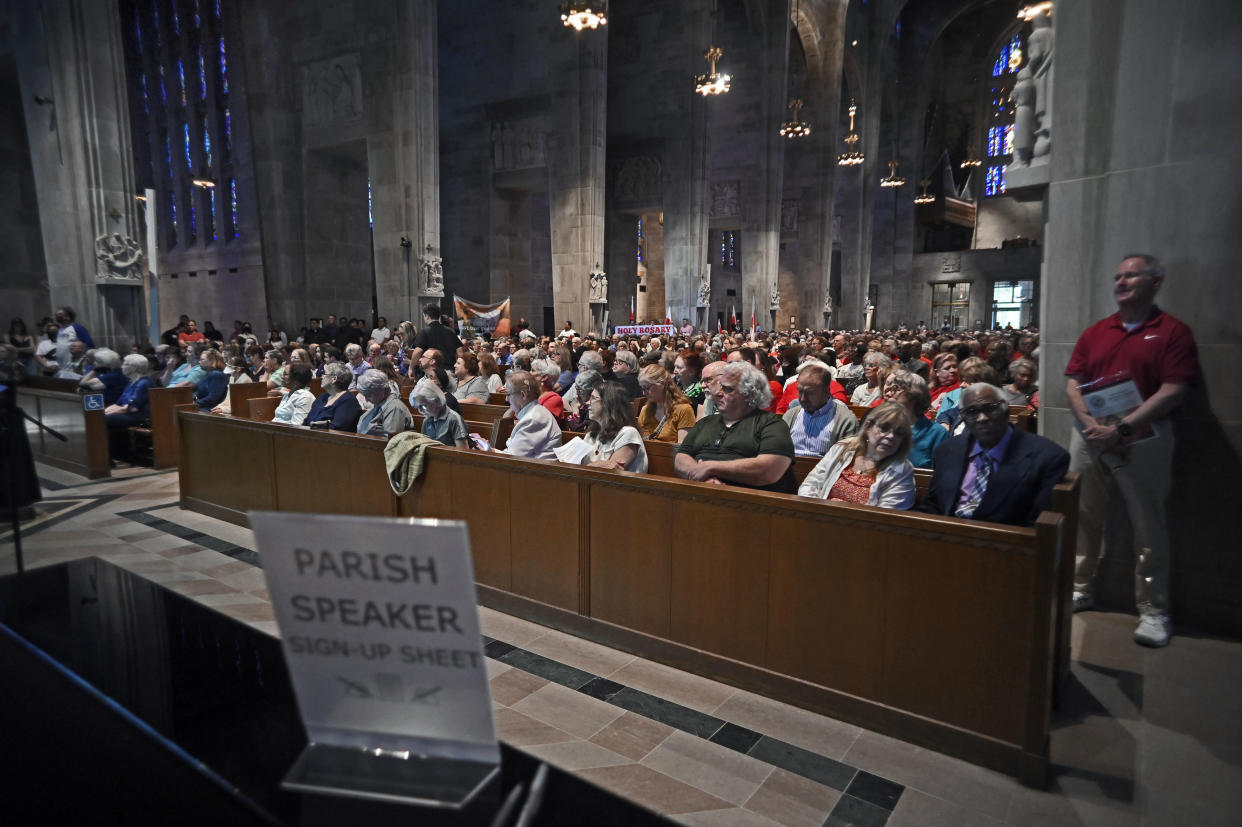Baltimore archdiocese’s final plans seal pain for some Catholics, give hope to others

While some Baltimore-area Catholics got sudden relief, others expressed disappointment, frustration and betrayal following the release of the Archdiocese of Baltimore’s final plan to radically change operations in the city and several suburbs.
Several local Catholics said they feel the plans to close their parish have already altered their relationship with the archdiocese, which set out on the painstaking task to reshape the church’s footprint on the city as already-declining Mass attendance failed to rebound from the coronavirus pandemic. The parishioners, some of whom have worshipped in the same building for decades despite moving away from the immediate area, expressed uncertainty about what they would do next.
Many churchgoers also noted they understood the archdiocese sat in a precarious position, accepting that difficult choices had to be made to maintain the stability of the church.
Archbishop William Lori released the final plan Wednesday. It will cut the number of Baltimore parishes by about two-thirds. The decisions came just over a month after the archdiocese shared its draft proposal with parishioners. That version was met with strong emotions at multiple town halls where Catholics vied for their parishes to survive.
The revised plan, while devastating for many churchgoers, included good news for others.
St. Rita, a small church in Old Dundalk that was initially slated to close along with two others in the Patapsco Neck area, will remain open as an additional worship site for a pastorate seated at Our Lady of Hope in Dundalk.
The reprieve came on the feast day for the more than 100-year-old church’s namesake, St. Rita of Cascia, who is canonized as the patroness of impossible causes.
“Many of us got chills when we saw the announcement,” said longtime parishioner Peggy Shaffer.
Shaffer said she and other parishioners were “very, very thankful” to have their church spared, adding that she saw the final decision as proof that the archdiocese’s decision-makers listened and took their responsibility “very, very seriously.”
At the same time, being spared means the community needs to be cognizant of that were not, and offer support as those parishes go through a heavier, more emotional transition, she added.
Those whose parishes are closing expressed dismay, saying they remained steadfast in their faith, but are now weary about the local archdiocese.
“I’m just hurt right now,” said Debbie Barksdale, a parishioner at Transfiguration Community Church who has run the Pigtown institution’s food bank for roughly two years and sings in the choir. “Whenever I think about it, I get sad. I just don’t know what to do.”
The latest reshaping of the church landscape is not the first to impact Barksdale, a lifelong Catholic. She came to Transfiguration in 2004 when her family’s previous place of worship, St. Martin of Tours, and two other Southwest Baltimore churches merged into Transfiguration.
The latest plan will close Transfiguration and St. Benedict, merging them into a parish seated several miles west at Our Lady of Victory, with St. Joseph’s Monastery as an additional worship site.
Barksdale, who lives in East Baltimore but attended Transfiguration because she liked the church community and its leadership, said she doesn’t “even know if I want to go back to church,” given that the location will close in the coming years. She also fears that others will leave her church community of the past two decades.
“I’m not losing my faith, because I always put God first,” she said, while noting she was struggling to reckon with her devotion and her distrust of diocesan officials.
“We’re supposed to be looking up to these people,” she said.
Barksdale and others noted their parishes’ strong ties, both spiritual and secular, to the communities they serve, and admonished the archdiocese for making decisions they believe will sever those connections in communities that need the most support.
Michael Coleman said that although he is not Catholic, he has long worked with Transfiguration on humanitarian efforts because the church has become a major part of the local community’s fabric.
“People feel like they were betrayed … stabbed in the back,” he said, alleging the church was pulling out of impoverished neighborhoods where its altruistic efforts do the most good.
Coleman spoke at the archdiocese’s final town hall meeting at The Cathedral of Mary Our Queen in North Baltimore, calling for peace and unity as several churchgoers vied for their parishes to remain open.
He said Thursday that he while he was there, he took note of the grand appearance of the cathedral, contrasting it with what he viewed as the church’s plan being based on its financial survival.
Archdiocese officials have said the realignment is necessary in the face of dwindling attendance and a host of aging buildings.
“Even with changes in our building footprint, the Church will remain present in Baltimore as we have since 1789, radiating Christ from sanctuaries to street corners,” the archdiocese said on its website.
Barksdale noted that people in need rely on the Transfiguration for its food bank, which is run once a month, as well as emergency resources the church provides multiple times a week.
“If we leave, we can’t serve the community,” she said.

